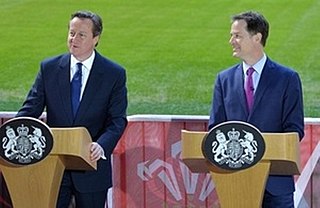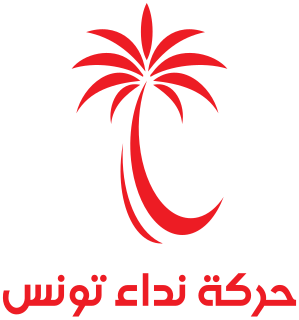Related Research Articles

Tunisia, officially the Republic of Tunisia, is the northernmost country in Africa. It is a part of the Maghreb region of North Africa, and is bordered by Algeria to the west and southwest, Libya to the southeast, and the Mediterranean Sea to the north and east; covering 163,610 km2 (63,170 sq mi), with a population of 11 million. It contains the eastern end of the Atlas Mountains and the northern reaches of the Sahara desert, with much of its remaining territory arable land. Its 1,300 km (810 mi) of coastline include the African conjunction of the western and eastern parts of the Mediterranean Basin. Tunisia is home to Africa's northernmost point, Cape Angela; and its capital and largest city is Tunis, located on its northeastern coast, which lends the country its name.

The United States secretary of state is an officer of the United States who implements foreign policy for the U.S. government as the head of the U.S. Department of State. The office holder is one of the highest ranking members of the president's Cabinet, and ranks the first in the U.S. presidential line of succession among Cabinet secretaries.
The Cabinet of Canada is a body of ministers of the Crown that, along with the Canadian monarch, and within the tenets of the Westminster system, forms the government of Canada. Chaired by the prime minister, the Cabinet is a committee of the Queen's Privy Council for Canada and the senior echelon of the Ministry, the membership of the Cabinet and ministry often being co-terminal; as of November 2015 there are no members of the latter who are not also members of the former.

Habib Bourguiba was a Tunisian lawyer, nationalist leader and statesman who led the country from 1956 to 1987 as the prime minister of the Kingdom of Tunisia (1956–57) then as the first president of Tunisia (1957–87). Prior to his presidency, he led the nation to independence from France, ending the 75-year-old protectorate and earning the title of "Supreme Combatant".

The government of Canada is the body responsible for the federal administration of Canada. A constitutional monarchy, the Crown is the corporation sole, assuming distinct roles: the executive, as the Crown-in-Council; the legislature, as the Crown-in-Parliament; and the courts, as the Crown-on-the-Bench. Three institutions—the Privy Council ; the Parliament of Canada; and the judiciary, respectively—exercise the powers of the Crown.
The prime minister of Tunisia is the head of government of Tunisia. The prime minister directs the executive branch along with the president and, together with the prime minister's cabinet, is accountable to the Assembly of the Representatives of the People, to the prime minister's political party and, ultimately, to the electorate for the policies and actions of the executive and the legislature.
Cheikh El Avia Ould Mohamed Khouna is a Mauritanian political figure. He was the 7th Prime Minister of Mauritania from January 2, 1996, to December 18, 1997, Minister of Foreign Affairs from July 12, 1998, to November 16, 1998, and Prime Minister again from November 16, 1998, to July 6, 2003, under President Maaouya Ould Sid'Ahmed Taya; later, he briefly served as Minister of Foreign Affairs again in 2008.

The Cameron–Clegg coalition was formed by David Cameron and Nick Clegg when Cameron was invited by Queen Elizabeth II to form a new administration, following the resignation of Prime Minister Gordon Brown on 11 May 2010, after the general election on 6 May. It was the UK's first coalition government since the Churchill caretaker ministry in 1945. The coalition was led by Cameron as Prime Minister with Clegg as Deputy Prime Minister and composed of members of both Cameron's centre-right Conservative Party and Clegg's centrist Liberal Democrats.

The Tunisian Revolution, also called the Jasmine Revolution, was an intensive 28-day campaign of civil resistance. It included a series of street demonstrations which took place in Tunisia, and led to the ousting of longtime president Zine El Abidine Ben Ali in January 2011. It eventually led to a thorough democratisation of the country and to free and democratic elections.
Lazhar Bououni was a Tunisian politician. He was the Minister of Justice and Human Rights. Prior to this, he was the Minister of Higher Education and Research.

Abdelaziz Ben Dhia served as the Tunisian Special Adviser to the President and Spokesman of the Republic under former President Zine El Abidine Ben Ali. In the aftermath of the 2010–2011 Tunisian revolution, he was placed under house arrest.
Naceur El Gharbi was the Tunisian Minister of Social Affairs, Solidarity, and Tunisians Living Abroad under former President Zine El Abidine Ben Ali.
Abderrahim Zouari is a Tunisian politician. He was the Minister of Transport from 2004 to 2011 under President Zine El Abidine Ben Ali. He was the candidate for the Destourian Movement in the 2014 presidential election. In January 2019, Zouari formed a party named Tahya Tounes.
Ahmed Eyadh Ouederni is a Tunisian politician. He was the Minister-Director of the Presidential Cabinet under former President Zine El Abidine Ben Ali.
Mounir Jaidane is a Tunisian politician. He was the Secretary General of the Government under former President Zine El Abidine Ben Ali.

A cabinet is a body of high-ranking state officials, typically consisting of the executive branch's top leaders. Members of a cabinet are usually called cabinet ministers or secretaries. The function of a cabinet varies: in some countries, it is a collegiate decision-making body with collective responsibility, while in others it may function either as a purely advisory body or an assisting institution to a decision-making head of state or head of government. Cabinets are typically the body responsible for the day-to-day management of the government and response to sudden events, whereas the legislative and judicial branches work in a measured pace, in sessions according to lengthy procedures.

Nidaa Tounes is a big tent secularist political party in Tunisia. After being founded in 2012, the party won a plurality of seats in the October 2014 parliamentary election. The party's founding leader Beji Caid Essebsi was elected President of Tunisia in the 2014 presidential election.

Othman Jerandi is a Tunisian politician and diplomat. He was the Minister of Foreign Affairs from March 2013 to January 2014. He was again elected to be the Tunisian Minister of Foreign Affairs in September 2020.

The Tunisian National Dialogue Quartet is a group of four civil society organizations that were central mediators in the effort to consolidate democratic gains and to form a lasting constitutional settlement in Tunisia following the unrest and historic regime change of the 2011 Jasmine Revolution.[1]
References
- ↑ "Tunisia–Chiefs of State and Cabinet Members of Foreign Governments". Central Intelligence Agency. 3 October 2011. Retrieved 2011-04-02.
- ↑ Thomas Schaaf (2008), Cathy Lee (ed.), The Future of Drylands: International Scientific Conference on Desertification and Drylands Research, Tunis, Tunisia, 19–21 June 2006, Springer, p. 5, ISBN 9781402069697
- ↑ A Directory of World Leaders & Cabinet Members of Foreign Governments (2008-2009 ed.), Arc Manor, 2008, p. 406, ISBN 9781604501551